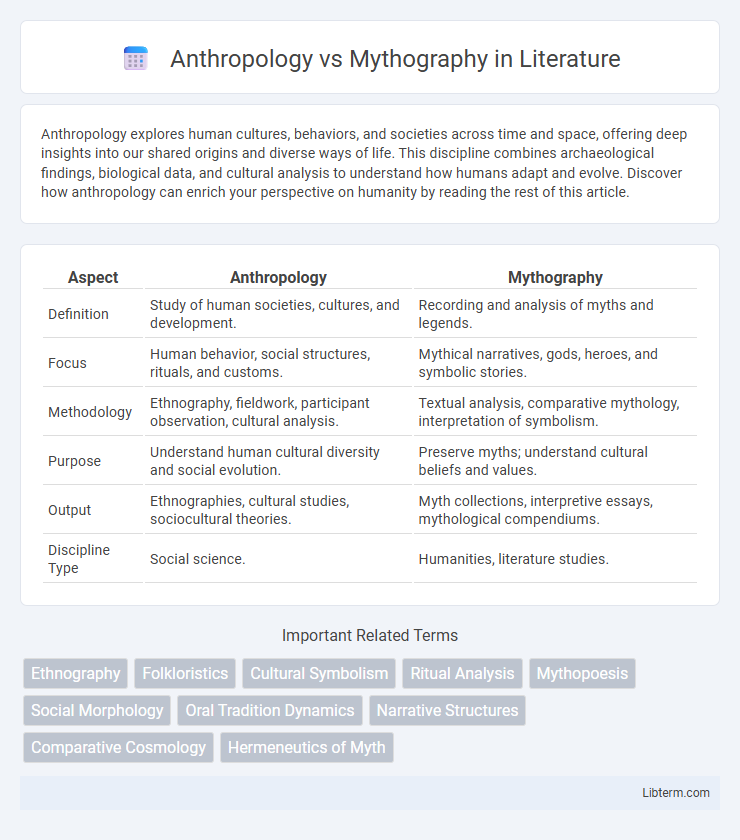Anthropology explores human cultures, behaviors, and societies across time and space, offering deep insights into our shared origins and diverse ways of life. This discipline combines archaeological findings, biological data, and cultural analysis to understand how humans adapt and evolve. Discover how anthropology can enrich your perspective on humanity by reading the rest of this article.
Table of Comparison
| Aspect | Anthropology | Mythography |
|---|---|---|
| Definition | Study of human societies, cultures, and development. | Recording and analysis of myths and legends. |
| Focus | Human behavior, social structures, rituals, and customs. | Mythical narratives, gods, heroes, and symbolic stories. |
| Methodology | Ethnography, fieldwork, participant observation, cultural analysis. | Textual analysis, comparative mythology, interpretation of symbolism. |
| Purpose | Understand human cultural diversity and social evolution. | Preserve myths; understand cultural beliefs and values. |
| Output | Ethnographies, cultural studies, sociocultural theories. | Myth collections, interpretive essays, mythological compendiums. |
| Discipline Type | Social science. | Humanities, literature studies. |
Introduction to Anthropology and Mythography
Anthropology studies human societies, cultures, and their development using ethnographic methods to analyze social behaviors and traditions. Mythography focuses on the systematic collection and interpretation of myths, exploring symbolic narratives that shape cultural identities and belief systems. Both disciplines reveal insights into human experience, with anthropology emphasizing empirical cultural analysis and mythography concentrating on myth as a vehicle for meaning and cultural transmission.
Defining Anthropology: Scope and Methods
Anthropology encompasses the scientific study of humans, their societies, cultures, and biological aspects across time, utilizing methods such as ethnography, participant observation, and comparative analysis to understand human behavior and social structures. This discipline integrates subfields like cultural anthropology, archaeology, linguistic anthropology, and physical anthropology to provide a holistic view of humanity's evolution and diversity. Contrastingly, mythography centers on the collection, interpretation, and analysis of myths and folklore, often employing literary and historical methodologies rather than empirical research characteristic of anthropology.
What is Mythography? Concepts and Approaches
Mythography is the systematic collection, description, and analysis of myths, focusing on their narrative structures, cultural contexts, and symbolic meanings. It explores how myths function within societies, emphasizing variations in storytelling, mythic themes, and the transmission of oral traditions across cultures. Key approaches in mythography include comparative mythology, structural analysis, and interpretive frameworks that uncover underlying cosmologies and social values embedded in mythic narratives.
Historical Development of Both Fields
Anthropology evolved from 19th-century ethnographic studies, emphasizing the scientific analysis of human cultures, societies, and biological aspects through fieldwork and comparative methods. Mythography, rooted in ancient traditions, developed as the systematic collection and interpretation of myths, seeking to preserve oral narratives and understand symbolic meanings within cultures. Over time, anthropology incorporated mythographic elements to analyze myths as cultural expressions, while mythography expanded through literary and historical scholarship to contextualize myths within broader socio-historical frameworks.
Key Differences Between Anthropology and Mythography
Anthropology studies human societies, cultures, and behaviors through empirical research and scientific methods, emphasizing cultural practices and social structures. Mythography focuses on the collection, analysis, and interpretation of myths and legends, prioritizing narrative traditions and symbolic meanings within cultural contexts. Whereas anthropology aims to understand human life through qualitative and quantitative data, mythography centers on exploring mythic content and its role in shaping cultural identity and worldview.
Overlapping Areas: Points of Intersection
Anthropology and mythography intersect in their exploration of cultural narratives, where anthropology examines myths as integral components of social structures and belief systems. Both disciplines analyze symbolic meanings within myths to understand human behavior, rituals, and identity formation across societies. Their overlapping areas include the study of myth as a lens for interpreting cultural values, historical memory, and existential themes.
Methodological Approaches Compared
Anthropology employs ethnographic fieldwork, participant observation, and qualitative interviews to analyze cultural practices and social behaviors within communities. Mythography focuses on the collection, classification, and interpretation of myths, emphasizing textual analysis and comparative mythology to understand narrative structures and cultural symbolism. Methodologically, anthropology prioritizes lived experience and empirical data, while mythography relies on literary sources and thematic categorization to derive meaning from mythic content.
Major Scholars and Influential Works
Anthropology features major scholars like Bronislaw Malinowski, whose *Argonauts of the Western Pacific* pioneered participant observation, and Claude Levi-Strauss, known for *Structural Anthropology*, which shaped modern myth analysis. Mythography includes influential figures such as Joseph Campbell, author of *The Hero with a Thousand Faces*, highlighting universal mythic patterns, and Robert Graves, whose *The Greek Myths* offers a comprehensive reinterpretation of classical mythology. These works collectively establish foundational methodologies and interpretations that define both disciplines' study of human culture and myth.
Practical Applications in Modern Research
Anthropology applies ethnographic methods and cultural analysis to understand human behavior, social structures, and rituals, providing practical insights into contemporary social issues, health, and development programs. Mythography, the systematic collection and interpretation of myths, offers valuable frameworks for exploring cultural narratives, identity, and symbolism, enhancing cross-disciplinary studies in literature, psychology, and comparative religion. Modern research integrates both fields to analyze how mythic themes influence cultural practices and social dynamics, informing policy-making, education, and conflict resolution.
Future Perspectives: Evolution of the Disciplines
Anthropology anticipates integrating advanced technologies like AI and big data analytics to deepen cultural understanding and human behavior analysis. Mythography is likely to evolve through digital humanities, enabling the preservation and reinterpretation of myths with multimedia tools and interactive platforms. The convergence of these disciplines promises enriched insights into human societies by combining empirical ethnographic research with narrative myth analysis.
Anthropology Infographic

 libterm.com
libterm.com